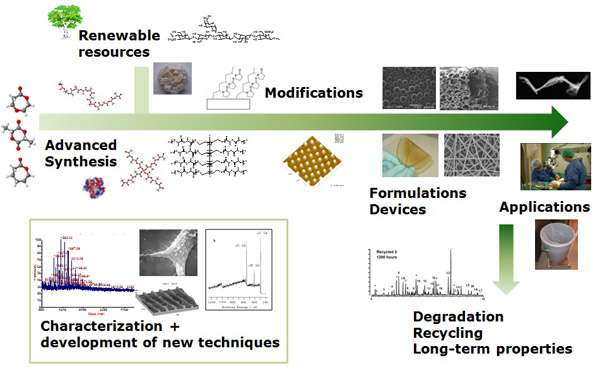Research overview

From design and synthesis to long-term properties and recycling of polymer materials
The research aims at design, syntheses and modification of stable and degradable polymers with sustainable profile for future application in biomedical, engineering and packaging materials. The new modified polymers have good long-term properties at the same time as they are made from renewable as well as traditional resources. A closed loop approach to polymeric materials is necessary which means that the syntheses are environmentally safe and that recycling techniques for polymers are further developed. Environmental interaction of polymeric materials is predicted by e.g. describing release and migration of low molecular weight compounds such as additives and degradation products.
Polymers are envisaged, the structure and properties of which will be optimised towards applications as implants to restore, maintain or improve tissue function ("guided tissue regeneration"). By Ring-Opening Polymerisation (ROP) bioresorbable scaffolds are made, involving synthesis of biocompatible polymers, surface modification,in-vitro testing. Development of standardised biocompatibility is persued and new products within the field of implants are target goal. Novel ROP methods involve a deep understanding of reaction kinetics and mechanisms and an approach toward sustainable synthesis. Strategic research, to develop a series of polymeric products based on renewable monomers, involves screening of agricultural and microbial resources. The degree of degradation, degradation mechanisms and products, all play a vital role for the interaction of polymeric materials with the environment. The research also adds risk assessment as a tool for demonstrating sustainability. Research is conducted on the development of adequate and accurate polymer characterisation methods for giving quality of recycled polymeric materials. In the area of recycling quality standards are presently developed. Central for the above are good extraction techniques and within the division SPE, SPME, MAE and ultrasonication have been developed and refined for various matrices (from biomedical degradable to recycled materials). New biocomposites based on recycled volume polymers and residual cellulose fibres develop surface modification to improve the compatibility. Applications for these products are within the automotive and other engineering products. In addition, new building materials are developed by use of alternative agricultural waste fibres.
Archived projects
Biomedical functional polymers
Long-term properties of polymeric materials
Novel food delivery materials based on hemicelluloses
